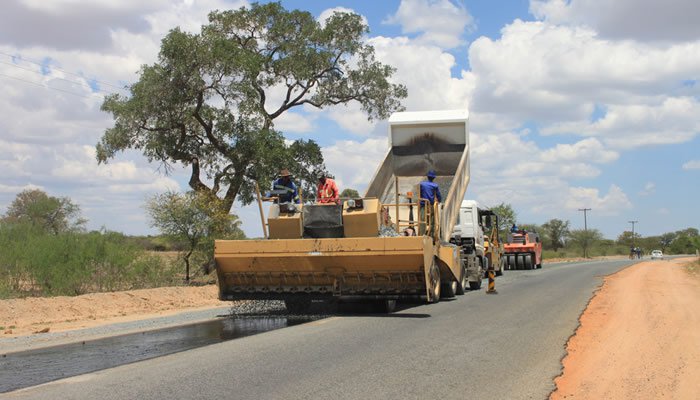By Gift Phiri
Japan has started a project to improve a road section along the northern part of the North-South Beira corridor from Chirundu to Karoi, in a bid to enhance cross border transport infrastructure (CBTI) by developing transportation corridors from inland areas to large-scale international ports.

The condition of the of road had badly deteriorated due to insufficient funds for maintenance as well as damage to road surfaces caused by overloaded vehicles.
The project is the culmination of a request of a grant aid the Zimbabwe government tabled to the government of Japan in 2015.
The project was consummated at a bilateral summit held in Tokyo on March 28 between Japan Prime Minister Shinzo Abe and President Robert Mugabe.
The objective of the project is to improve transportation and logistics as well as traffic safety in the northern part of the North-South corridor from Chirundu to Karoi by “constructing climbing lanes and improving horizontal and vertical alignment.”
The project is part of an industrial strategy by the Eastern African Community (EAC) trade bloc together with Comesa, Africa’s largest trade bloc, and the Southern African Development Community (Sadc), to pool resources from foreign financiers for the development of infrastructure in the region.
Some of the projects in the North-South Beira corridor include the rehabilitation of five roads in Botswana, Malawi and Zimbabwe.
Besides road networks, other projects requiring immediate implementation include railways and power networks by governments of the trade blocs.
The three trade blocs have also agreed to work out measures to have common customs regulations and rules to ease intra-trade and shore up economic development.
The Japanese embassy in Harare said on October 22, the Japan International Cooperation Agency (Jica), started the preparatory survey for the improvement of the Chirundu-Karoi road section.
The Jica survey team leader, Shuntaro Kawahara, said that the aim of the preparatory survey was to prepare an outline design which would be necessary for the appraisal of grant aid on the side of the government of Japan.
Jica, together with Zimbabwe’s Transport and Infrastructural Development ministry and in particular the Department of Roads (DOR), will formulate the best project components, the Japanese embassy said, adding the survey will take one year, including three on-site follow-up surveys.
Kawahara said: “Japan developed its highway network coping with mountainous topography and as such would like to share Japanese experiences of designing and constructing highway with MOTID to improve the northern part of the corridor characterized with mountainous terrain synonymous with Japan.”
Munesu Munodawafa, the permanent secretary of Transport and Infrastructural Development ministry, reiterated the importance of the project as it would be beneficial to people of both Zimbabwe and it’s neighbouring countries through enhanced traffic flow and safety as well as redundancy of the international corridor network within the Southern African region.
Hideaki Morita, chief engineer of the Jica survey team, emphasised the concept of “working together” to create ownership.
“I was encouraged by the enthusiasm and good capacity of Zimbabwean engineers during our site survey and the series of discussions with them.
“DOR engineers’ input is critical as we work together to consider the best technical solution given the fact that they are naturally familiar with their road conditions and challenges at hand,” Morita said.
Japan is seeking closer ties with Zimbabwe that could help it gain access to natural resources and provide new markets.
Zimbabwe, a $14bn economy for which mining is the biggest source of foreign currency, has the world’s biggest platinum reserves after SA, as well as chrome, gold and iron ore.
Japan has already pumped millions into development projects in Zimbabwe.
In 2002, Japan extended grant aid to build the New Chirundu Bridge with the dual lane, 400-metre long and 120-tonne maximum road across the Zambezi River between Zimbabwe and Zambia.
In 2009, with support from Jica and other partners, the Chirundu One-Stop Border Post was launched to enhance trade facilitation through efficient movement of goods and people along the North-South Corridor.
Earlier this year, Japan also pledged to increase its support to infrastructure, humanitarian assistance and healthcare projects.
Japan’s growing projects re seen as a counterweight to what it sees as growing Chinese influence in the region.
“Japan is putting money into new infrastructure and raising its presence, and it is necessary for Japan (to) gain more influence,” said one of the sources, with knowledge of the plan. Daily News






